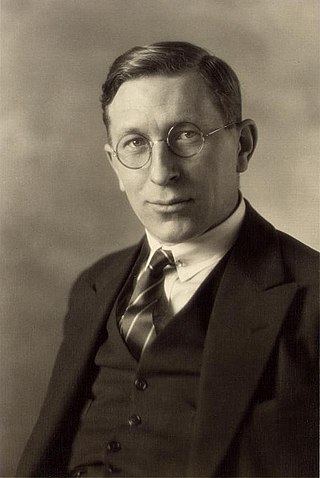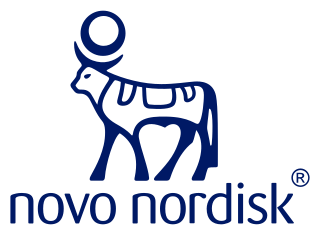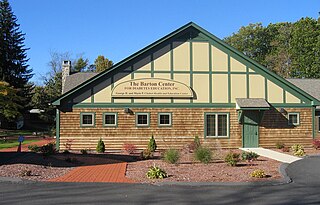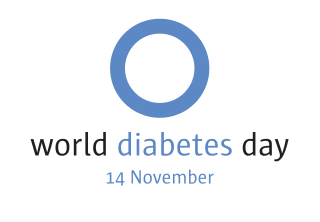
Sir Frederick Grant Banting was a Canadian pharmacologist, orthopedist, and field surgeon. For his co-discovery of insulin and its therapeutic potential, Banting was awarded the Nobel Prize in Physiology or Medicine with John Macleod.

Novo Nordisk A/S is a Danish multinational pharmaceutical company headquartered in Bagsværd with production facilities in nine countries and affiliates or offices in five countries. Novo Nordisk is controlled by majority shareholder Novo Holdings A/S which holds approximately 28% of its shares and a majority (77%) of its voting shares.

James Bertram Collip was a Canadian biochemist who was part of the Toronto group which isolated insulin. He served as the chair of the department of biochemistry at McGill University from 1928 to 1941 and dean of medicine at the University of Western Ontario from 1947 to 1961, where he was a charter member of The Kappa Alpha Society.
JDRF is a nonprofit 501(c)(3) organization that funds type 1 diabetes (T1D) research, provides a broad array of community and activist services to the T1D population and actively advocates for regulation favorable to medical research and approval of new and improved treatment modalities. It was initially founded as the JDF, the Juvenile Diabetes Foundation. It later changed its name to the Juvenile Diabetes Research Foundation and is now known as JDRF.
The Association of Jewish Aging Services (AJAS) was founded in 1960 as the North American Association of Jewish Homes and Housing for the Aging (NAJHHA). It was created and continues to function as the central coordinator for homes and residential facilities for Jewish elderly in North America. Dr. Herbert Shore was the driving force behind the establishment of AJAS and was the organization's first president and its founding executive vice president.
The California Dental Association (CDA) is a nonprofit, professional organization representing organized dentistry in California. Founded in 1870, CDA’s membership currently consists of 27,000 dentists in 32 local dental societies throughout the state of California, making it the largest constituent of the American Dental Association.

TOPS Club, Inc. is a non-profit charitable corporation based in Milwaukee, Wisconsin, United States, having members in chapters located worldwide, the majority of them in the United States and Canada. Its twofold objective is to sponsor research and foster support groups in human body weight control. Most members refer to the organization simply as "TOPS", an acronym for "Take Off Pounds Sensibly."
Obesity Canada - Obésité Canada (OC), formerly known as the Canadian Obesity Network - Réseau canadien en obésité (CON-RCO), is a Canadian charitable organization. It connects members of the public affected by obesity, researchers, health professionals and others with an interest in obesity.

The Barton Center for Diabetes Education is an independent, non-profit 501(c)(3) organization, located in North Oxford, Massachusetts, dedicated to the education of children living with diabetes and their families and caregivers through year-round programs. The mission is to improve the lives of children with insulin-dependent diabetes through education, recreation, and support programs which inspire and empower.

The Arthritis Foundation is a nonprofit organization addressing the needs of people living with arthritis in the United States.

World Diabetes Day (WDD) is the primary global awareness campaign focusing on diabetes mellitus and is held on 14 November each year.

Nurses in Canada practise in a wide variety of settings, with various levels of training and experience. They provide evidence-based care and educate their patients about health and disease.

The Alzheimer Society of Canada (ASC) is a Canadian health charity for people living with Alzheimer's disease and other dementias. Active in communities right across Canada, the Society partners with Alzheimer Societies in every Canadian province to offer information, support and education programs for people with dementia, their families and caregivers. The Alzheimer Society of Canada acts as the national voice for the thousands of Canadians living with dementia and advocates on their behalf for positive change. The Society also funds young and established Canadian researchers working to find the causes and a cure through the Alzheimer Society Research Program.
The ALS Society of Canada is a registered, not-for-profit Canadian organization. ALS Canada, founded in 1977, is a national voluntary health organization dedicated to the fight against amyotrophic lateral sclerosis (ALS), also known as Lou Gehrig's disease, and to providing support for those living with ALS.

Banting House is a former residence and current museum in London, Ontario, Canada. Located at 442 Adelaide Street North, it is known as the “Birthplace of Insulin.” It is the house where Sir Frederick Banting woke up at two o'clock in the morning on October 31, 1920 with the idea that led to the discovery of insulin.
The Canadian Lung Association is a national organization and volunteer-based health charity that supports lung health research, education, prevention of disease/disorders and advocacy in Canada.
International Diabetes Center at Park Nicollet (IDC) is a center for diabetes care, research and education located in Minneapolis, Minnesota, United States. The center provides clinical, motivational and educational services for people with diabetes. It is part of HealthPartners Institute.
Calvin Ralph Stiller is a Canadian physician, scientist, and entrepreneur. He retired as a member of the Schulich School of Medicine & Dentistry at Western University in London, Ontario.

The Connaught Medical Research Laboratories was a non-commercial public health entity established by Dr. John G. FitzGerald in 1914 in Toronto to produce the diphtheria antitoxin. Contemporaneously, the institution was likened to the Pasteur Institutes in France and Belgium and the Lister Institute in London. It expanded significantly after the discovery of insulin at the University of Toronto in 1921, manufacturing and distributing insulin at cost in Canada and overseas. Its non-commercial mandate mediated commercial interests and kept the medication accessible. In the 1930s, methodological advances at Connaught updated the international standard for insulin production.
Walter Ruggles "Dynamite" Campbell was a Canadian physician and diabetologist, known as the first physician "to administer insulin to a patient."











